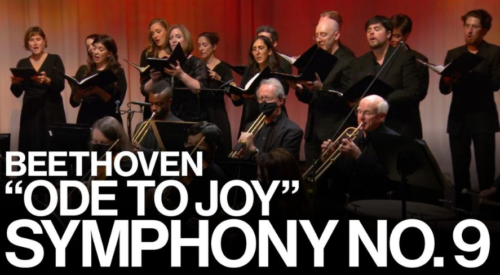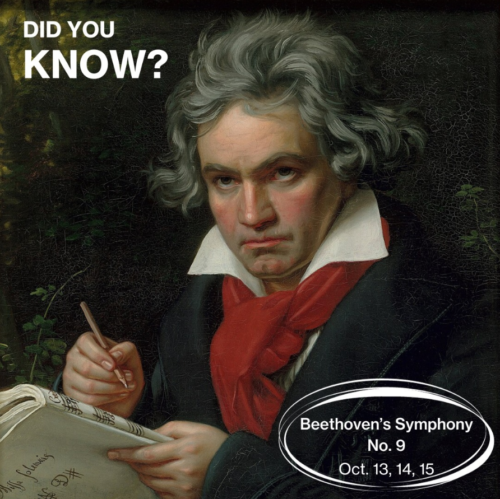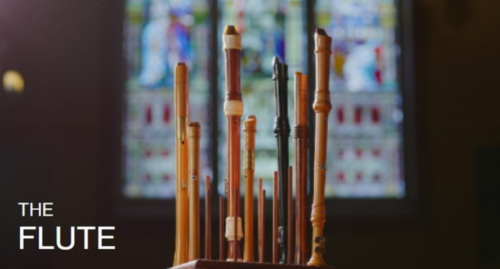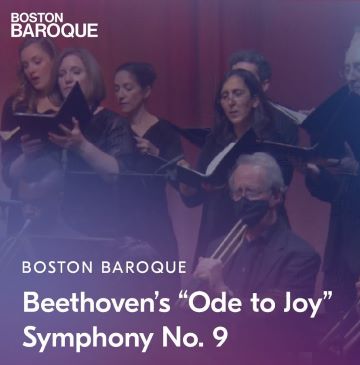Ludwig van Beethoven’s monumental Symphony No. 9 is not only Beethoven’s final complete symphony but also one of his most well-known works. The piece’s fourth movement includes adapted text from “Ode to Joy,” a poem by Friedrich Schiller, and Beethoven’s “Ode to Joy” melody has become a popular humanist anthem (so catchy it was used as the theme for Fandango: “Movies, movies, mo-o-o-vies”).
It was written years after his first eight and in the final years of his life. Since its premiere in 1824, with Beethoven conducting even as he had become fully deaf at that point, the work has been applauded for its unprecedented nature. From the first movement that places the listener into an imperceptible stream of sound, to the final movement’s first inclusion of the human voice and a dramatic narrative in a symphony, the Symphony No. 9 has become one of the most iconic musical works in the Western repertoire.
Now, Boston Baroque, North America’s first permanent baroque orchestra, will perform the beloved symphony on period instruments. Last heard on the Boston Baroque stage in 2013’”only one other time in its 50-year history’”Beethoven’s final symphony is rarely performed on period instruments in modern times. These performances give audiences the unique opportunity to hear Beethoven’s music as it was performed in his lifetime. Boston Baroque’s renowned chorus and orchestra will bring the program to life under the baton of Founding Music Director Martin Pearlman.
For listeners who have grown up hearing their Beethoven played by regular modern symphony orchestras, Boston Baroque’s performances will present some striking differences. You’ll be surprised to hear more detail and more of the content of what’s in Beethoven’s score, as the different strands of the instrumental lines emerge with an enhanced clarity. The way the instruments were formed and constructed in that period make them much more distinct from one another than their more powerful modern equivalents. What you get in a period orchestra are three things: greater individuality of timbre, more transparency of texture and an increased dynamism once all the instruments are stretched to their absolute maximum capacity of volume and expressivity.
For example, above we have the baroque flute. It has quite a different look from a modern flute, being made of wood and having only eight holes that can come in different sizes. Some notes may come off weaker than in a modern flute, but the stronger notes are just as effective.
And what soloists! Four Metropolitan opera stars will grace the Boston Baroque stage, including soprano Heidi Stober, mezzo-soprano Daniela Mack, tenor William Burden, and bass Eric Owens in his company debut.
Heidi Stober possesses a versatile voice that effortlessly spans a wide range of genres, from Mozart and Baroque to the dramatic operas of Verdi and Wagner. Her repertoire even extends to musical theater classics like Show Boat and Sweeney Todd. During the peak of the pandemic, she ventured into electronica and dance music, collaborating with Berlin-based DJ Micky Friedmann. Her exceptional vocal clarity and acting prowess have earned her acclaim in prestigious opera houses across Europe and the US.
Daniela Mack, a mezzo-soprano of Argentinian origin, stands at the forefront of a new generation of opera singers. She infuses her artistry with a compelling blend of intensity, adventurousness, and effortless charisma. Recent seasons have seen Ms. Mack make significant debuts at renowned venues, including The Met, where she portrayed the Kitchen Boy in Rusalka, the Royal Opera House-Covent Garden as Rosina in Il barbiere di Siviglia, and Teatro Real as Rosmira in Partenope. She also graced the stage of Carnegie Hall in a memorable performance of Serse with The English Concert.
William Burden’s illustrious career has taken him to the world’s most prestigious opera houses, from The Met to Teatro alla Scala, Glyndebourne, Santa Fe Opera, and Lyric Opera, where Stage and Cinema said of Capriccio, “William Burden shines as the composer Flamand.” His repertoire is remarkably diverse, encompassing iconic title roles in operas like Les Contes d’Hoffmann, Faust, and The Rake’s Progress. Burden’s artistry extends to creating roles in new operas by contemporary composers such as Jake Heggie, Mark Adamo, Christopher Theofanidis, and Tobias Picker.
Bass-baritone Eric Owens enjoys a distinctive reputation as an esteemed interpreter of classical works and a passionate advocate for new music. His commanding presence, expansive vocal range, and natural acting abilities have graced stages around the globe. Notably, The Tristan Project at Disney Hall, at compelling performances in leading roles at The Met, including Kaija Saariaho’s L’amour de Loin, Dvorák’s Rusalka and John Adams’s Doctor Atomic. He has also portrayed the complex characters of Alberich and Hagen in Wagner’s epic “Ring” cycle.
The program will begin with two other works by Beethoven’”the “Coriolan” Overture and “Elegiac Song.” Inspired by Heinrich von Collin’s play Coriolan’”which in turn was based on one of Shakespeare’s less frequently performed tragedies, Coriolanus’”the all-orchestral “Coriolan” overture was performed at the palace of Beethoven’s patron Prince Lobkowicz in 1807 before a production of von Collin’s play. The music takes the listener on the tragic journey of the Roman General Coriolanus, who rebelled against Rome and was ultimately killed.
Beethoven’s “Elegiac Song” is also a rarely-heard gem from an interesting period of Beethoven’s life. Composed in-between what is known as Beethoven’s “heroic” period but before his final years, the work reflects Beethoven’s sense of searching for a new musical language. Performed with chorus and orchestra, this solemn song hints at the more abstract, introspective style of his later years.
Boston Baroque
All-Beethoven Program
Symphony No. 9 with soloists Heidi Stober, Daniela Mack, William Burden, and Eric Owens
Coriolan Overture
“Elegiac Song.”
Friday, October 13 at 8pm at Sanders Theatre in Cambridge
Saturday, October 14 at 8pm at GBH’s Calderwood Studio in Brighton (livestreamed)
Sunday, October 15 at 3pm at NEC’s Jordan Hall in Boston
for tickets, in-person ($25-$125) and livestream ($9 and up), call 617.987.8600 or visit Baroque Boston
the virtual performance will become available to stream on-demand 30 days after the live air date




